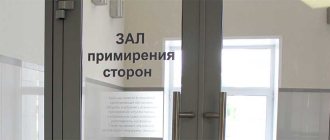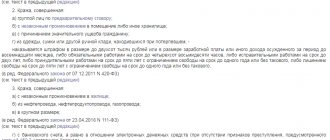Theft is a serious crime and there must be grounds for the charges. Evidence may include:
- hair residues;
- fingerprints;
- personal belongings of the criminal forgotten at the scene of theft;
- witness statements;
- camera recordings;
- being caught red-handed.
An unsubstantiated accusation is unlawful even if the polygraph indicated the involvement of the suspects in the offense. The accused is not required to undergo this procedure; his refusal does not indicate guilt.
Theft is defined by the Criminal Code of the Russian Federation as the secret theft of someone else's property. Finding a criminal is not an easy task, which is carried out through searches, confrontations, interrogations, and other operational investigative work.
Article of the Criminal Code of the Russian Federation
The Criminal Code of the Russian Federation classifies theft as a criminal offense . In other words, this is a crime of varying severity - it can be either a minor sin or a rather serious charge. Categories of thefts are distinguished from the total mass of reports by how much, what and how were stolen. However, the basic definition remains general. The theft is carried out secretly and is the deliberate theft of the property of another citizen of the Russian Federation. If a citizen discovers a theft in the process of committing it, its name changes to outright robbery.
The differentiation of thefts by severity is specified in Article 158 of the Criminal Code of the Russian Federation . Let's look at the components of this legislative document in more detail.
Part one gives a comprehensive description of what theft is - it lists all the common (or standard) cases when an illegal act actually constitutes it.
The second part examines the concept of collective theft (committed by a team of people), and also examines the actions of pickpockets and theft from warehouses or offices (non-residential premises).
The third part separates from general thefts those that:
- Resulted in a major loss of the victim's property;
- Are made from apartments or residential buildings;
- They are related to the theft of the natural resources of the planet or country.
The fourth part describes the deliberate commission of thefts by criminal groups (organized gangs), as well as theft on an especially large scale.
Also, the article describes the penalties that apply to persons who have committed one or more of the above crimes. In addition to the type of theft and items, the punishment will depend on the method of committing the crime, aggravating or mitigating circumstances, and the value of what was stolen.
In this case, you will have to defend yourself using the same methods. It doesn’t matter whether you were accused of petty theft or a fairly serious crime.
How to get help from a lawyer for free?
If you need the help of a defense attorney in a criminal case, you can seek paid assistance from one of the legal offices in your city - the necessary addresses and telephone numbers can be easily found on the Internet.
What to do if you don’t have money for a lawyer? If your income is less than the minimum subsistence level established in your region of residence, you can contact your local Bar Association and receive free legal assistance.
Such “charity” is paid for from the local budget and includes:
- Written or oral consultation;
- Assistance in drawing up documents;
- Representation of interests in court.
Note! If your income is above the subsistence level or you are denied access to a government lawyer, you can turn to the site’s lawyers for help - this is a simple and reliable way to get qualified help in the shortest possible time.
What to do if accused of a crime?
Defend yourself, definitely. To do this, you will have to prove to the court that you are innocent - more precisely, they cannot even bring charges against you without sufficiently strong evidence of your guilt. Remember this. The first and main method of your defense will be based on the presumption of your innocence . This means that your guilt must be proven in order for the fact of the crime to “fall” on your shoulders. Legal proceedings cannot begin unless the victim provides at least some evidence to government law enforcement agencies.
What this really means is that if you are innocent, you don't have to worry about anything. After all, the prosecutor simply won’t find evidence. However, inaction can lead to falsification of evidence against you , so the first thing to do is call the police yourself. Employees will need to explain that you are being accused of a theft that you did not commit. And also that you are ready to cooperate with the investigation in any way.
Next, you still have to confirm your words. It is best if you have an alibi or witnesses to your presence in another place - human testimony takes precedence over any technical evidence. However, if you cannot provide witnesses, no problem. Video and audio recordings, your photographs, and any confirmed fact that you were in another place or do not have a motive to commit a crime will do.
After this, if you are nevertheless charged and summoned to court, contact a lawyer. It is important to choose a specialist who specializes in thefts - this way you will ensure that the person knows what he is doing (he has eaten more than one dog at this). A lawyer will quite easily find evidence of your innocence if you really did not commit any crime.
If you were acquitted due to lack of evidence (and you really did not steal anything from your accuser), you can file a counterclaim that you were slandered. Accordingly, if the theft victim deliberately decided to defame you (and you have evidence of this), she herself will face criminal penalties for libel.
How can you prove your innocence?
According to the law, a person who is suspected of committing any crime, including theft, is not required to do anything. In other words, he doesn't have to prove his innocence. But in practice, a lot depends on the actions of the accused. In particular, it is important to provide information that can refute the victim’s claims.
For example, a suspect may have an alibi for the time the theft occurred. Of course, witnesses will be needed to confirm his words. But the alibi must be real, as problems may arise for providing false information. For example, this applies to witnesses who have provided deliberately false testimony. They may be held accountable under Art. 307 of the Criminal Code of the Russian Federation.
Punishment
Different parts of Article 158 of the Criminal Code establish specific types, terms and amount of punishment when a citizen commits proven theft.
So, general legal penalties mean that you will have to:
- Pay money (fine) - no more than 80,000 rubles;
- Go to compulsory work - no more than 360 hours;
- Send to correctional labor for a period of no more than a year;
- Accept restrictions on your freedom for a period of no more than two years;
- Go through arrest - for a period of 4 months;
- Lose your freedom for a period of no more than two years.
Theft from pockets of clothing, non-residential premises or group theft (not organized crime) may be punished as follows:
- Two hundred thousand rubles of fines - no more, but less;
- 480 or less mandatory work;
- The assignment of correctional labor is for a period of no more than two years;
- Assignment of forced labor for a period of no more than five years;
- Imprisonment – up to 5 years in prison.
Major thefts, thefts from apartments and houses, as well as theft of the country's natural resources are punished as follows:
- Five hundred thousand rubles in fines – no more, but less;
- Imprisonment - no more than 6 years (in this case, a fine of 80,000 rubles may also be charged for subsequent violations);
- Forced labor – no more than 5 years.
Particularly large-scale thefts, as well as the activities of gangster groups committing theft, imply the following penalties:
- No more than ten years imprisonment;
- Fine up to a million rubles.
Can a lawyer save you from charges under Art. 158 of the Criminal Code?
If there is a truly false fact of criminal prosecution due to obvious abuses or investigative errors, yes, only an experienced lawyer will help restore justice and help avoid illegal prosecution. If a person is accused under Art. 158 in theft for a crime he actually committed, then the assistance of a lawyer will influence the amount of the imposed punishment and will allow him to achieve the minimum possible sanction. To do this, the court should present materials characterizing the person and identify mitigating circumstances that were not noticed by the investigator.
The most common results of competent work of a lawyer:
- The prosecutor's refusal to charge;
- Termination due to absence of elements or events of a crime;
- Termination of the case for reconciliation of the parties;
- Termination due to insignificance.
Many cases under Article 158 are often reclassified to a more lenient case for a number of objective reasons that the investigation could not or did not want to see.
The imputed significant damage may not be such for the victim, and the penetration into the home crumbles before our eyes after the real status of the premises, which is not residential, is revealed.
There are dozens of examples of the effective work of a lawyer, but in each specific case he has to work from scratch, without templates.
What to do if you are guilty of theft
Unfortunately, in this case you face one of the above options. To mitigate the situation or even agree to resolve the issue “peacefully”, it is necessary to confess to the crime, as well as return the stolen property . It would also be useful to pay the injured party compensation for material and moral damage. This process is called “conciliation” and will involve you fully resolving any disputes with the applicant. Criminal liability in such cases may not apply if the applicant abandons his claim.
The sentence is also mitigated by confession and cooperation with the investigation. You will have to fully admit what you have done, agree to compensation, and then the criminal punishment may become many times milder than originally intended by law.
Can you be prosecuted for false accusations?
Responsibility for knowingly false reporting of a crime is provided for in Art. 306 of the Criminal Code of the Russian Federation. If a person provided false information publicly, which affected honor and dignity, according to Art. 128.1 of the Criminal Code of the Russian Federation, this is a matter of private prosecution. The victim should apply to bring the perpetrator to justice and provide evidence.
Compensation for moral damage can be demanded according to the rules provided for by the Civil Code of the Russian Federation. If a case is initiated and the judge makes a guilty verdict, attach to the civil statement of claim a copy of the verdict that has entered into force, evidence of the dissemination of information and the discrepancy of the information with reality. For all questions related to unproven accusations of theft, you can seek advice from our specialists by contacting them through the website or by phone.
Store employees demand payment of fine
If you are offered to immediately pay a fine for theft, do not agree. Security guards, store employees, and police are trying to take advantage of the situation, but there is no need to rush. To officially assign a punishment, you need to go through court hearings, as a result of which the court finds you guilty or not guilty of theft, only then the amount of the fine that needs to be paid is determined. If there is no evidence, they cannot recover anything from you.
Note!
The very fact that they are persistently extorting money from you on the spot should alert you. Most likely, the demanding party does not have legal grounds to charge you with theft.
Even if you have evidence that you have an unpaid item, do not agree to immediately pay the fine, as you risk giving away your funds twice:
- when you give money to extortionists;
- when you are officially found guilty of theft.
During interrogation, you must insist on your innocence and inform the investigator or interrogator who can confirm the testimony. It is necessary to find as many witnesses as possible who can indirectly confirm innocence. Submit a request for billing to determine your location by mobile phone during the period of theft. To do this, it is enough to provide the investigator with the subscriber number and imei of the mobile phone.
You can take a lie detector yourself at a commercial organization or an examination based on an investigator’s decision. Positive characteristics from your place of work, school, neighbors, and information about your financial situation can be added to the case materials. All requests must be made in writing through the police office or sent by mail.
If you bring the application in person, be sure to take a second copy to mark receipt. If your request is denied, appeal it to the head of the law enforcement agency, the prosecutor's office or the court.
If security wants to inspect personal belongings
Most often, security guards show suspicion and assume that you stole goods in the territory they guard, so they ask you to show the contents of your pockets or personal bags. These actions are unlawful, since all that the security has the right to do if there is suspicion is to detain you and call the police to refute or confirm the theft. Such actions are described in Art. 12 of the Law of the Russian Federation “On private detective and security activities in the Russian Federation” dated March 11, 1992 No. 2487-1.
If the guards insist on searching your personal belongings, remind them of your rights and ask to call law enforcement. If you receive a refusal, call the police yourself. The search of things, as well as the suspect, should be carried out only by employees of the Ministry of Internal Affairs and in the presence of witnesses. If a suspect is found to have stolen goods, this fact must be documented, with the signatures of all witnesses.
Note!
If the guards took any unlawful actions, the victim has the right to file a lawsuit or the prosecutor’s office and demand compensation for moral damage.
Detention is permitted by law only in one case: there is evidence that the suspicions are well founded. Video cameras must record the facts when the suspect:
- walked up to the goods and took it;
- hides the goods in a pocket or bag;
- moves with goods;
- did not pay for the goods at the checkout;
- trying to leave the store.
What did the citizens do?
Soviet people were not very willing to part with expensive things so easily. Therefore, even women, in those cases where this was possible, gave a good rebuff to the thieves. Elastic bands were also practiced, sewn to the headdress to fix it on the chin. Thanks to this method, stealing a fur product was no longer so easy. Even men used rubber bands.
However, not everyone was ready to risk money buying an expensive accessory. Many people purchased faux fur hats that cost pennies. Of course, the appearance of such hats was significantly different from real fur hats.
Found a violation? Report content








